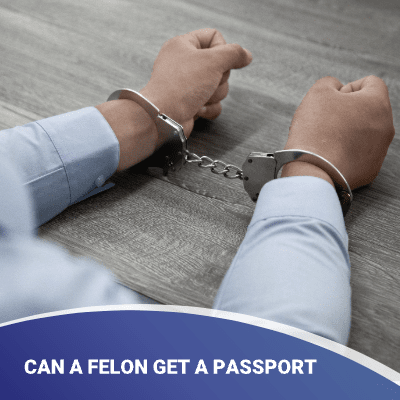
Understanding the Rules: Can a Felon Get a Passport?
Mithas
- 0
Can a Felon Get a Passport?
Understanding the Rules: Can a Felon Get a Passport?
Can a felon get a passport? This question often arises for individuals with criminal records who wish to travel internationally. Obtaining a passport is a crucial document for travel outside of the country, but there are certain restrictions and requirements that felons must be aware of before applying. We will explore the rules and regulations surrounding felons and passport eligibility and provide tips and advice for those navigating this process.

The General Eligibility Criteria for Obtaining a Passport
To be eligible for a U.S. passport, an individual must fulfill several baseline requirements. Firstly, one must demonstrate U.S. citizenship or nationality. This is typically achieved through presenting valid proof, such as a naturalization or birth certificate. Secondly, applicants must provide photo identification, including a driver’s license or a government-issued ID card. Alongside these documents, a passport photograph that meets the State Department’s specifications must be submitted.

Finally, the process involves the payment of a fee, which varies depending on the type of passport service requested. These foundational criteria apply to all individuals aspiring to obtain a passport and serve as the first step in the application process. Importantly, these requirements are the same for everyone, regardless of criminal history, establishing a uniform starting point for all applicants.
Specific Restrictions for Felons

Felons may face several barriers when applying for a passport, contingent upon their criminal history and current legal status. Individuals serving probation or parole or those with outstanding charges typically find their passport applications denied. This is also true for felons wanted on severe criminal charges or those under federal arrest warrants. Furthermore, specific convictions, particularly those related to drug trafficking across international borders, could render a felon ineligible for a passport. It is also critical for felons to understand that restrictions can extend to the type of convictions they have, with certain offenses leading to more stringent scrutiny or outright disqualification from obtaining a passport. These limitations are designed to prevent the flight of individuals sought by law enforcement and to comply with international agreements regarding the movement of persons convicted of serious crimes.
The Process of Applying for a Passport as a Felon

Felons seeking a passport must embark on the standard application journey, akin to other applicants. This entails accurately completing the designated forms, assembling the requisite documentation, and dispatching the application to the U.S. Department of State for evaluation.
Honesty is crucial throughout this process, especially regarding one’s criminal background. Concealing or misrepresenting facts about one’s criminal history can thwart the application’s success and potentially lead to legal repercussions.
Another step for felons involves preparing to substantiate their criminal history with appropriate documentation. This might include presenting court records, documentation evidencing the completion of probation or parole, or any other legal documents that affirm their eligibility under the State Department’s guidelines.
While the foundational application steps mirror those of applicants without a criminal record, the nuanced attention to disclosing and documenting one’s criminal past is a unique aspect for felons.
Moreover, patience during this process is advised, as applications involving criminal histories may undergo more thorough scrutiny, potentially extending processing times. Felons should remain prepared to address any inquiries from the State Department regarding their application and maintain a line of open communication to facilitate the review process. Engaging the services of a legal professional who specializes in passport applications for individuals with criminal records can provide invaluable guidance and support throughout this intricate process.
Travel Restrictions Even After Obtaining a Passport

Navigating international travel as a felon with a passport introduces challenges beyond the initial acquisition of travel documents. Understanding the Rules: Can a Felon Get a Passport? While obtaining a passport is a significant hurdle, it does not guarantee unfettered access to all countries.
Various nations enforce strict regulations concerning the admission of individuals with criminal records, which can vary widely in severity and the type of offenses considered prohibitive. Consequently, it becomes imperative for individuals with felony convictions to conduct thorough research on their intended destinations’ entry policies. This due diligence is essential to avoid unexpected denials at immigration checkpoints, which not only disrupt travel plans but may also result in considerable financial loss.
Moreover, some countries require travelers to obtain visas in addition to holding a valid passport, and the visa application process often involves a detailed review of the applicant’s criminal background. This can include requests for additional documentation, personal interviews, or both, extending the scrutiny a felon may face even after securing a passport.
As such, preparation and transparency about one’s criminal history become critical components of planning international travel. Engaging with the embassies or consular offices of the destination countries well in advance of planned travel dates can clarify specific entry requirements and reduce the likelihood of entry denial based on past convictions.
Tips and Advice for Felons Applying for a Passport

Navigating the passport application process as a felon requires a careful approach to ensure compliance and success. Here are essential tips: Always prioritize transparency about your criminal record.
Withholding or altering information can derail your application and expose you to legal consequences. Be thorough in gathering and presenting any documentation that elucidates your criminal history, including court records or evidence of completed probation or parole. Understanding the Rules: Can a Felon Get a Passport? Such documents are crucial in demonstrating your eligibility for a passport.
Engaging a legal professional experienced in managing passport applications for those with criminal backgrounds can offer significant advantages. They can provide tailored advice, assist in preparing your application, and help navigate any complexities related to your criminal history. Adhering to these guidelines can enhance your chances of a favorable outcome in your quest to obtain a passport, setting the stage for your international travel plans.

